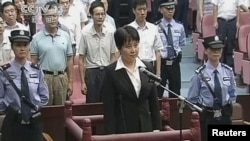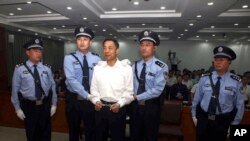BEIJING — One of China's most closely watched criminal trials swung quickly to a close this week in what has been portrayed as a straightforward case. Gu Kailai confessed to killing British businessman Neil Heywood and for that she was handed a swift suspended death sentence.
But, for some observers, many questions remain - particularly about the individual the case has all but ignored Gu's husband and fallen Chinese political star Bo Xilai.
In the Chinese media, Gu Kailai goes by the name of Bo Gukailai, with her husband’s surname placed in front of hers.
However, aside from that brief mention of him, Bo’s name has hardly come up in connection with Gu’s trial.
Unanswered questions
Mo Shaoping, a rights lawyer in Beijing, says one of several questions the case left unanswered is how much Bo Xilai knew about the murder and when?
Mo says the question of when Bo found out has legal and criminal implications. Mo says, if Bo knew about his wife’s plans before hand, he could have been considered an accomplice in the murder. If it was after the fact, he could have been charged with covering the murder up.
The rights lawyer says another glaring question that was quickly glossed over during the trial, was Gu’s claim that Neil Heywood was threatening her son, Bo Guagua, over a business deal gone bad.
Mo says that if the two had some kind of business dispute that was so bad that it led Heywood to threaten the life of Bo Guagua, what was the dispute all about? He says these and other questions were left unanswered by the court.
Insulation
Some political analysts have concluded that the ruling shows that China’s Communist party leaders are looking to insulate themselves and Bo from any further damage. Some argue the ruling shows that little more will happen to Bo.
Others say a government investigation into Bo continues and his wife’s trial is but another step in that process.
Gauging what may come next is hard in a country where the government continues to hold even simple details, such as the dates for upcoming leadership meetings, as tightly guarded secrets.
Trial coverage in Chinese media this week has been muted at best, with many relying entirely on a report from the state-run Xinhua News Agency.
However, there is more commentary online on websites and social media sites.
In some postings on China’s Twitter-like Sina Weibo site, Gu Kailai’s name is starting to be used to describe anyone believed to have gotten away with murder.
'Political game of chess'
One user argued that Gu was just a pawn in some bigger political game of chess, while another called the ruling a “farce” that was “made up to deceive the public.”
Pu Zhiqiang, a Beijing-based lawyer says it is hard not to see the ruling as rigged and that the trial skipped over the lingering issue of corruption.
Pu says that, with all of the accusations, rumors and concerns that have been raised about Gu and her business practices in the past, is it possible that she is guilty of just one crime?
Mo says it is also curious that Gu, with her extensive legal experience and massive political power, did not just choose to stage a traffic accident to have Neil Heywood killed.
Mo says, regardless of how angry Gu was and how much hatred she had for Heywood, it is hard to comprehend why she personally carried out the murder and did it in a five-star hotel.
For some in China, the court’s sentencing is perhaps the most puzzling aspect of the case. In a country with a notoriously tough criminal justice system, Gu’s suspended death sentence could see her free on medical parole in as few as nine years. That sentence is far more lenient that what most face for premeditated murder.
But, for some observers, many questions remain - particularly about the individual the case has all but ignored Gu's husband and fallen Chinese political star Bo Xilai.
In the Chinese media, Gu Kailai goes by the name of Bo Gukailai, with her husband’s surname placed in front of hers.
However, aside from that brief mention of him, Bo’s name has hardly come up in connection with Gu’s trial.
Unanswered questions
Mo Shaoping, a rights lawyer in Beijing, says one of several questions the case left unanswered is how much Bo Xilai knew about the murder and when?
Mo says the question of when Bo found out has legal and criminal implications. Mo says, if Bo knew about his wife’s plans before hand, he could have been considered an accomplice in the murder. If it was after the fact, he could have been charged with covering the murder up.
Gu Kailai Bio Box
Bo Xilai's wife, Gu Kailai, is at the center of one of the most sensational scandals to rock China's Communist Party.- Did not dispute charges she murdered British businessman Neil Heywood
- Charged with the murder of British businessman Neil Heywood
- Worked as a successful lawyer before retiring as her husband's career took off
- Wrote a book about her experience helping Chinese companies win a U.S. legal battle
- Daughter of a prominent Communist leader
Mo says that if the two had some kind of business dispute that was so bad that it led Heywood to threaten the life of Bo Guagua, what was the dispute all about? He says these and other questions were left unanswered by the court.
Insulation
Some political analysts have concluded that the ruling shows that China’s Communist party leaders are looking to insulate themselves and Bo from any further damage. Some argue the ruling shows that little more will happen to Bo.
Others say a government investigation into Bo continues and his wife’s trial is but another step in that process.
Gauging what may come next is hard in a country where the government continues to hold even simple details, such as the dates for upcoming leadership meetings, as tightly guarded secrets.
Trial coverage in Chinese media this week has been muted at best, with many relying entirely on a report from the state-run Xinhua News Agency.
However, there is more commentary online on websites and social media sites.
In some postings on China’s Twitter-like Sina Weibo site, Gu Kailai’s name is starting to be used to describe anyone believed to have gotten away with murder.
'Political game of chess'
One user argued that Gu was just a pawn in some bigger political game of chess, while another called the ruling a “farce” that was “made up to deceive the public.”
Pu Zhiqiang, a Beijing-based lawyer says it is hard not to see the ruling as rigged and that the trial skipped over the lingering issue of corruption.
Pu says that, with all of the accusations, rumors and concerns that have been raised about Gu and her business practices in the past, is it possible that she is guilty of just one crime?
Mo says it is also curious that Gu, with her extensive legal experience and massive political power, did not just choose to stage a traffic accident to have Neil Heywood killed.
Mo says, regardless of how angry Gu was and how much hatred she had for Heywood, it is hard to comprehend why she personally carried out the murder and did it in a five-star hotel.
For some in China, the court’s sentencing is perhaps the most puzzling aspect of the case. In a country with a notoriously tough criminal justice system, Gu’s suspended death sentence could see her free on medical parole in as few as nine years. That sentence is far more lenient that what most face for premeditated murder.





